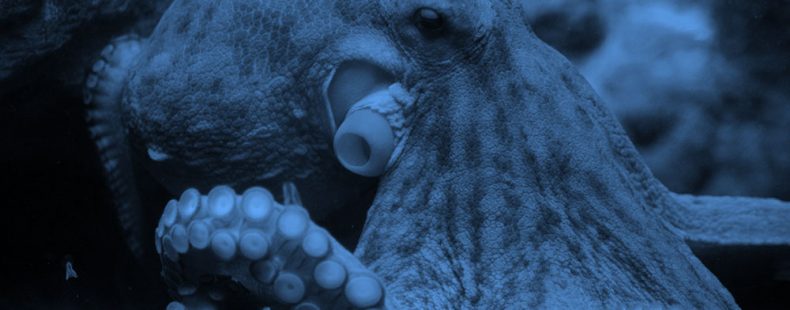You probably know that octopuses and squids are different animals, but if one latched onto you and refused to let go until you were able to list all the differences, how much would you really be able to say? (Scary hypothetical, we know.)
After all, they’re both boneless sea creatures with lots of arms, right? Well, sort of. There are several major differences, not to mention the consideration of what constitutes a tentacle and what constitutes an arm.
In this article, we’ll discuss the similarities and the differences between octopuses and squids, including number of arms (and how they differ from tentacles), size, body and head shape, diet, and habitat.
⚡ Quick summary
Octopuses have round bodies and eight sucker-covered limbs. Squids have a more triangular shape and 10 limbs—eight arms and two tentacles. Both range in size, but the largest squids (around 60 feet) are far larger than the biggest octopuses (around 16 feet). Squids travel continuously, and some move in schools, while octopuses are more solitary, often living in dens. They also differ in anatomy and diet.
What is the difference between a squid and an octopus?
Octopuses and squids are different types of animals, but they have many similarities. Both are cephalopods, a type of mollusk (itself a type of invertebrate with a soft, unsegmented body). They both have several arms, which are attached to their head, and these arms are usually covered with parts that allow them to grip things. And they both have hard, sharp beaks that they use to eat.
But there are major differences.
arms/tentacles
Squids have 10 appendages, while octopuses have only eight. Octopus appendages are considered arms (not tentacles!), and they are always covered with suckers (suction cup-like parts that can attach to things). Squids’ 10 appendages are not all the same: eight of them are arms. Depending on the species, these may be covered in suckers or hooks. A squid’s other two appendages are considered tentacles (distinguished from arms by having suction bits only on the tip).
How are octopuses related to the month of October? Learn about the month’s name here.
mantle
The mantle is the part of a cephalopod that contains the organs. Squids have a mantle shape that’s longer and more triangular, whereas octopuses’ mantle is round. Squids have small fins on their mantle, while octopuses do not.
anatomy
The only non-squishy part of an octopus is its beak. Squids have beaks, but they also have a hard internal structure called a pen that’s really a bit of shell.
size
The size ranges of octopuses and squids are also different. The smallest octopus species is under an inch, while the largest is around 16 feet. The smallest squid species is also under an inch, but the largest recorded can be up to 60 feet. So while the tiniest squids and octopuses may be similar in size, the largest squid is far larger than the largest octopus.
habitat
Squids and octopuses both prefer warm, salty water, though some have been unexpectedly found in the Arctic Ocean and waters off Antarctica.
habits
Squids travel through the ocean continuously. Some squid species are solitary, while others live in schools. Octopuses are mostly solitary, and they usually live in dens on the ocean floor.
diet
Squids eat fish and crustaceans (and sometimes other squids), catching their prey with their tentacles. Octopuses often eat mollusks and crustaceans, catching them with their arms and injecting them with venom.
Similar animals
Squids and octopuses may be the most well-known cephalopods, but they’re not the only ones. Other cephalopods include the cuttlefish, which looks kind of like a squid, and the nautilus, which is the only member of the family to have a full shell.
In summary, if you see a sea creature with eight sucker-covered arms and a round shape, that’s an octopus. But if it’s got a long, thin, triangular shape and 10 limbs—eight arms and two tentacles—it’s a squid. If you see it swallowing a ship, it’s a kraken.
This leaves just one question: is it octopuses or octopi?














